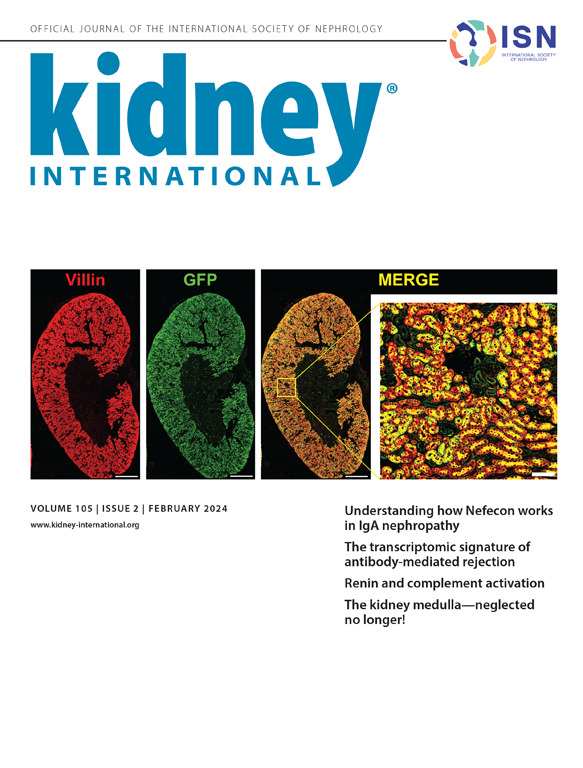代谢功能障碍相关肾脏疾病:发病机制和临床表现。
IF 14.8
1区 医学
Q1 UROLOGY & NEPHROLOGY
引用次数: 0
摘要
近年来,人们的生活方式和饮食行为发生了重大变化,其特点是高热量食物的摄入增加,久坐不动,缺乏体育锻炼。超重和肥胖患病率的增加导致代谢功能障碍及其相关并发症,如心血管疾病和慢性肾脏疾病(CKD)。本文综述的目的是强调代谢功能障碍相关肾脏疾病(MDAKD)的重要性、临床特征和发病机制。MDAKD是一个术语,描述由代谢功能障碍引起的肾脏疾病,通常在代谢综合征(MetS)的背景下,其特征是CKD存在于代谢异常的个体中,如肥胖、胰岛素抵抗、糖尿病、血脂异常和高血压。mmdakd包括糖尿病肾病(DKD)、肥胖相关肾病(ORKD)以及越来越多的其他罕见肾脏疾病,其中代谢功能障碍可能影响进展。mmdakd是由代谢功能障碍驱动的疾病谱系的一部分,最近提出了新的命名,包括代谢功能障碍相关脂肪变性肝病(MASLD)和心肾代谢综合征(CKM综合征)。mmdakd的新术语进一步强调了代谢功能障碍对肾脏疾病的致病作用。本文章由计算机程序翻译,如有差异,请以英文原文为准。
Metabolic Dysfunction Associated Kidney Disease: Pathogenesis and Clinical Manifestations.
In recent years, there have been significant changes in the lifestyle and eating behaviors of the population characterized by increased intake of high-calories food and a sedentary lifestyle without physical activity. The increased prevalence of overweight and obesity has led to metabolic dysfunction and their related complications, such as cardiovascular disease and chronic kidney disease (CKD). The purpose of this review is to highlight the importance, clinical features and pathogenesis of metabolic dysfunction-associated kidney disease (MDAKD). MDAKD is a term that describes kidney disease arising from metabolic dysfunction, often in the context of metabolic syndrome (MetS) and is characterized by the presence of CKD in individuals with metabolic abnormalities such as obesity, insulin resistance, diabetes mellitus, dyslipidemia, and hypertension. MDAKD includes diabetic kidney disease (DKD), obesity-related kidney disease (ORKD) and with increasing recognition of other rarer kidney diseases where metabolic dysfunction may impact progression. MDAKD is part of the spectrum of diseases whose pathogenesis is driven by metabolic dysfunction and has recently led to the proposal of new nomenclature including metabolic dysfunction associated steatotic liver disease (MASLD) and Cardio-Kidney-Metabolic Syndrome (CKM Syndrome). The new terminology of MDAKD provides additional emphasis on the pathogenic role of metabolic dysfunction on kidney disease.
求助全文
通过发布文献求助,成功后即可免费获取论文全文。
去求助
来源期刊

Kidney international
医学-泌尿学与肾脏学
CiteScore
23.30
自引率
3.10%
发文量
490
审稿时长
3-6 weeks
期刊介绍:
Kidney International (KI), the official journal of the International Society of Nephrology, is led by Dr. Pierre Ronco (Paris, France) and stands as one of nephrology's most cited and esteemed publications worldwide.
KI provides exceptional benefits for both readers and authors, featuring highly cited original articles, focused reviews, cutting-edge imaging techniques, and lively discussions on controversial topics.
The journal is dedicated to kidney research, serving researchers, clinical investigators, and practicing nephrologists.
 求助内容:
求助内容: 应助结果提醒方式:
应助结果提醒方式:


